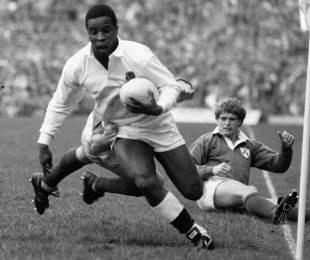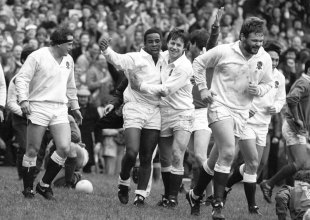|
England 35-3 Ireland, Twickenham, March 19 1988
England run riot after famine
Richard Seeckts
March 19, 1988

Chris Oti leaves the Ireland defence for dead as he goes over at Twickenham
© PA Photos Enlarge
"It was probably the most extraordinary match that any of us at Twickenham had ever seen." So The Sunday Times opened its account of the day England's try famine turned to feast in breathtaking style. Six tries in 40 exhilarating minutes not only silenced England's many critics but provided an overture for the Will Carling years, English rugby's most successful period, prior to the 2003 World Cup. Though Chris Oti's hat-trick grabbed the headlines, this was the delivery of a package long promised by England manager, Geoff Cooke. His pre-match warning, "I really feel that things are moving forward for us and, even amid the defeats, the players have felt that one day they are going to go out and stuff someone," had not been taken seriously by many observers. Few shared Cooke's patience or belief in his young team after defeat to France and Wales, and an unconvincing 9-6 win over Scotland. But the portents were good. Scrum-half Nigel Melville's rehabilitation from injury and premature retirement was complete when he was restored as captain for the Scotland match. The young three-quarters, Oti, Simon Halliday, Will Carling and Rory Underwood had pace and strength aplenty, and the nucleus of the pack had been in place since before the 1987 World Cup. Dean Richards, in particular, owed a debt to the rugby public after his late night high jinks with John Jeffrey had caused significant damage to the Calcutta Cup in Edinburgh. The 100th England v Ireland match was not even the main event of the day, as Wales were taking on France at Cardiff Arms Park in a Grand Slam bid. Wales misfired horribly in the rain, losing 10-9, so sharing the championship with France. Use of points difference to identify an outright winner was not considered necessary until the introduction of a Five Nations Championship trophy in 1993. Ireland, it was felt, were on the way down, the Times describing their scrummage as "a thing of bits and pieces, their lineout a variable force". Talented though their backs were, without early ball they would be impotent. To win the battle up front, Ireland had to hope that Welsh referee Clive Norling would take a dim view of Jeff Probyn's controversial style of propping.
In the event, Norling controlled the match sympathetically, awarding very few penalties. The first half was uneventful, even dull until Michael Kiernan slotted a drop-goal in the 40th minute. Moments later, Melville was tackled into touch. He crashed into the advertising boards, breaking his right leg and dislocating his ankle. John Orwin took over the captaincy and, perhaps inadvertently, used the injury to motivate his men. "It's bound to affect you when you see someone crying out in pain," he explained later. "I told the players that what he went through would be for nothing if we didn't win it." Richard Harding replaced Melville at half-time and England immediately created space and added pace to their game. Suddenly the passes were going fast and wide. Rory Underwood was in the thick of the action and almost reached the line for the first try, the ball eventually being taken over by Gary Rees.

England's Chris Oti is congratulated on his hat-trick score
© PA Photos
Enlarge
Having broken their duck, England ran riot. Rob Andrew and Simon Halliday showed flair not seen earlier in the championship, Oti was given space to run and went over in the corner. Minutes later Halliday broke three Irish tackles before sending him over in the corner again. Jonathan Webb, tearing up from full back, provided the vital link for Oti's third, finished with a masterful jink inside to wrong-foot the Irish tacklers. The crowd's ovation was tremendous, choruses of 'Swing Low, Sweet Chariot' filling the Twickenham air, legend has it, for the first time. In under 11 minutes, Oti, England's first black player for over 80 years, had scored the first hat-trick at Twickenham for 64 years. With Ireland's defence now in tatters, Underwood claimed two tries on the right wing, reward at last for the many occasions early in his England career when he barely received a pass. It was hard to believe that, Melville aside, the same teams had played both halves of this match. Oti's name was made in only his second international and his future looked bright. He missed England's summer tour to Australia and Fiji but was back in the team in 1989. Thereafter, Oti's career was blighted by injury. He played the last two of his 13 internationals in the 1991 World Cup, when his most notable feat was to miss a tackle on New Zealand's John Kirwan that led to a try. Looking back on his career, Oti reflected, "I don't think I ever fulfilled my potential. I felt I could have done a lot better. But the hat-trick was a marvellous thing to have achieved." © ESPN Sports Media Ltd.
| ||||||||||||||||||||||||||||||
Live Sports
Communication error please reload the page.
-
Football
-
Cricket
-
Rugby
-
- Days
- Hrs
- Mins
- Secs
F1 - Abu Dhabi GP
Abu Dhabi Grand Prix December 11-131. Max Verstappen ()
2. Valtteri Bottas (Mercedes)
3. Lewis Hamilton (Mercedes)
4. Alexander Albon ()
5. Lando Norris ()
6. Carlos Sainz Jr ()
-
ESPNOtherLive >>
Golf - Houston Open
Snooker - China Open
Tennis - Miami Open

